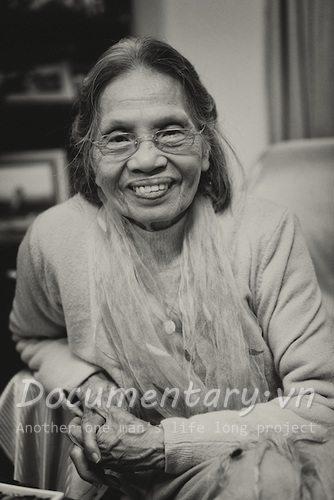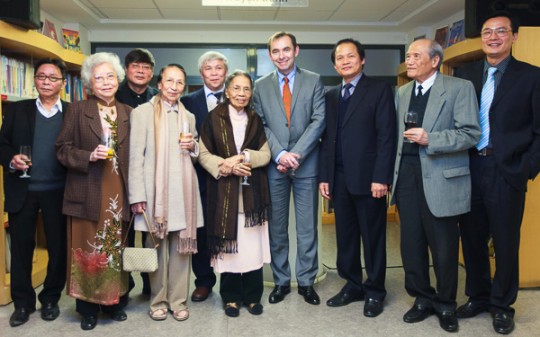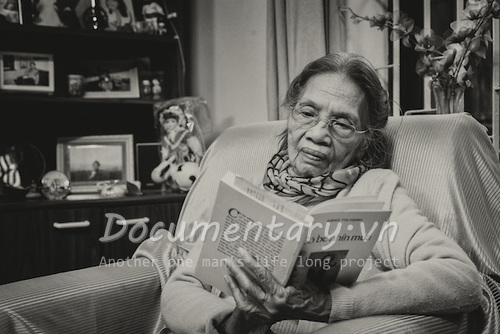Today, Associate Professor and Distinguished Educator Dang Thi Hanh has passed away!
These articles, filled with emotion from generations of colleagues and students, evoke fond memories of the image of "a disciplined, exemplary teacher, but also a compassionate person in his perspective and thoughts about life."
The University of Social Sciences and Humanities, Vietnam National University, Hanoi, is pleased to present to readers an article by Associate Professor Dr. Dao Duy Hiep about Associate Professor and Distinguished Educator Dang Thi Hanh, with heartfelt appreciation!
Associate Professor, Distinguished Teacher Dang Thi Hanh/Photo: Thanh Long
She was a disciplined and exemplary teacher, but also a compassionate person in her perspective and thoughts about life. She wrote slowly, but captivatingly. I enjoyed her memoirs about her childhood, her hometown, and the people she encountered – from street vendors to famous figures. Those were truly beautiful pages of writing.
1. In the early 1980s, I first met Ms. Dang Thi Hanh when I was hired to work in the Department, then called the Foreign Literature Group. Before that, she had also taught my older brother at high school. It was through my brother that I learned more about her family. With her academic background, serious and straightforward personality inherited from her family tradition, and meticulous academic approach, she possessed a solid and reliable expertise in French literature.
2. Since her retirement, she has rarely appeared in public or traveled much, not just now, at the age of 85. At the beginning of her memoir, "The Little Girl Watching the Rain," she wrote: "I was born in Hue, in a very memorable year, 1930. But my furthest memory of childhood, that is, of myself, is set in a village in Nghe An." She is thin and appears austere, but in reality, she is an artist in her perspective on life and people; a compassionate soul. She is radiant, laughs heartily, and is naturally cheerful when her articles are published in the Literature and Arts newspaper or even in a magazine whose name might seem unfamiliar to the literary world in the South. This is understandable: because these are the intellectual offspring born from her careful academic study, her understanding of life, quietly but with much compassion and emotion. This influences her writing style, grammar, and word choice. Anyone who has ever interacted with her can see that she is not a very talkative person. On the contrary, sometimes her language seems to lag behind her train of thought – at those times she stumbles, but not incoherently. Sitting on the thesis defense committee (back when she was still working) or occasionally in recent years, when she agrees to review some theses or dissertations, listening attentively, one can learn much that might take months or even years to grasp. These are issues of literary theory or observations on the art of a particular writer. That stumbling, I think, is precisely the richness and abundance, sometimes unconsciously manifested in sentences that seem grammatically incorrect. Her handwriting is beautiful, old-fashioned, and easy to read, but sometimes it is also "winding" and ornate, with arrows pointing to the margins where additions are made due to her earlier "stumbling" before her thoughts had time to organize. And, contrary to what is said, her writing, once published, is soft yet sharp, echoing experiences and knowledge, sometimes quite witty and cheerful.

Dang Thi Hanh - "The little girl who watches the rain" through time / Photo: Thanh Long
3. She was a disciplined and exemplary teacher, but also a compassionate person in her perspective and thoughts about life. It's a pity she didn't write much. Perhaps it was partly due to overthinking and a reluctance to cause offense; and partly due to her health. Her eyesight wasn't good, and she had undergone several surgeries. She wrote slowly, but her writing was captivating. I particularly enjoyed her memoirs about her childhood, her homeland, and the people she encountered – from street vendors to famous figures. Those were truly beautiful pages of writing. "She and Her Grandchild" is a memoir of two childhood worlds separated by more than half a century, written with a witty, lyrical style close to literary creations. Someone once said, "the bite of time spares no one." Her lyrical and philosophical reflections on life, on the countless fates of loved ones, flow gently and softly through each page of her memoirs, preserved by the fading passage of time through haunting lines of her writing. These are spaces of reminiscence, of innocent, gentle dreams, of cherished memories. In her search for lost spaces, Dang Thi Hanh's creative work revitalizes the ruins of memories that time has eroded and erased in many others. Memories are given and received against a backdrop of oblivion, of the dust and ashes of human time. And here, memory, so poetic, "seems much closer to oblivion than what is called memory." Remembering and forgetting intertwine... Only a gaze remains, a beautiful, clear, and melancholic light. A poem about lost days... She is not a professional writer in the sense of creating fiction, but rather a "historian" based on the memories of individuals, families, and lineages. But the beauty lies in the poetic quality of truth, of reality experienced and contemplated.

Associate Professor Dang Thi Hanh poses for a commemorative photo with the Ambassador of the Republic of France, Jean-Noël Poirier, and faculty members of the University of Social Sciences and Humanities, on the occasion of her being awarded the Order of Academic Palms by the French Government in February 2013. Photo: Thanh Long
4. Her remaining body of work today, and perhaps even in the future, besides a considerable number of translations and articles published in specialized newspapers and journals, includes articles in the textbook "History of French Literature," the scholarly treatise "Hugo's Novels," and the book "Some Faces of 20th-Century French Prose," both excellent and insightful. We are familiar with Hugo, but reading her scholarly work, that familiarity becomes strange. She analyzes almost the entire creative process of this writer's important prose works. Each of Hugo's works is examined in the light of narrative and structural theories, uncovering and discovering truly fascinating and compelling aspects. She applies theories of rhythm, structure, narrator, voice, time, and space to her very convincing analyses of Hugo's novels. Each of these articles is a work, a creation born from creativity. Just as there is a Notre Dame Cathedral made of stone, there is also a Notre Dame Cathedral made of paper – Hugo's immortal novel.
5. Every written work is a dialogue with oneself, with others, and with the times. What remains after a lifetime may be a great fortune, nothing at all, or a very high title, but I think, most fortunate of all, is leaving behind good books, where those who come after can read the feelings, the joys and anxieties, the happiness and sadness, the knowledge from life and books, and the unfinished dialogues, left for others to continue. In her memoir, "Grandmother and Grandchild," there is a truly profound sentence: "Because everything in this world, without exception, must rise and fall with Time: thus, the face of things in this world changes, both the centers of kingdoms and the land registers of empires."
Only memories and affection remain, as the sentence seems to suggest.
Author: Assoc. Prof. Dr. Dao Duy Hiep
The website editorial team requests permission to revise the article title.
|
Associate Professor, Distinguished Teacher Dang Thi Hanh
.Year of birth: 1930
.Hometown: Nghe An
.Graduated from Hanoi University of Literature in 1956.
.He was awarded the title of Associate Professor in 1984.
.Awarded the title of Excellent Teacher in 2010
.Order of Academic Palms (Republic of France) 2013
.Period of service at the school: From 1965 to 1990
Affiliation: Department of Foreign Literature, Faculty of Literature (Hanoi University)
. Main research directions:Applying the approaches and techniques of the New Criticism movement, particularly the findings of structuralism in literature, to the novels of Hugo and Proust.
Notable scientific works:
History of French literature in the 20th century(Editor), Foreign Language Publishing House, 1993.
Grandmother and grandchild(Memoirs), Women's Publishing House, 1994.
Some prominent figures in 20th-century French prose, Da Nang Publishing House, 2000.
Hugo's novels(Discourse), National University Publishing House, 2002.
The little girl looked at the rain.(Memoirs), Women's Publishing House, 2008.
Translation:
Jean Tardieu's Letter from Hanoi
Kafka's Distortion |


